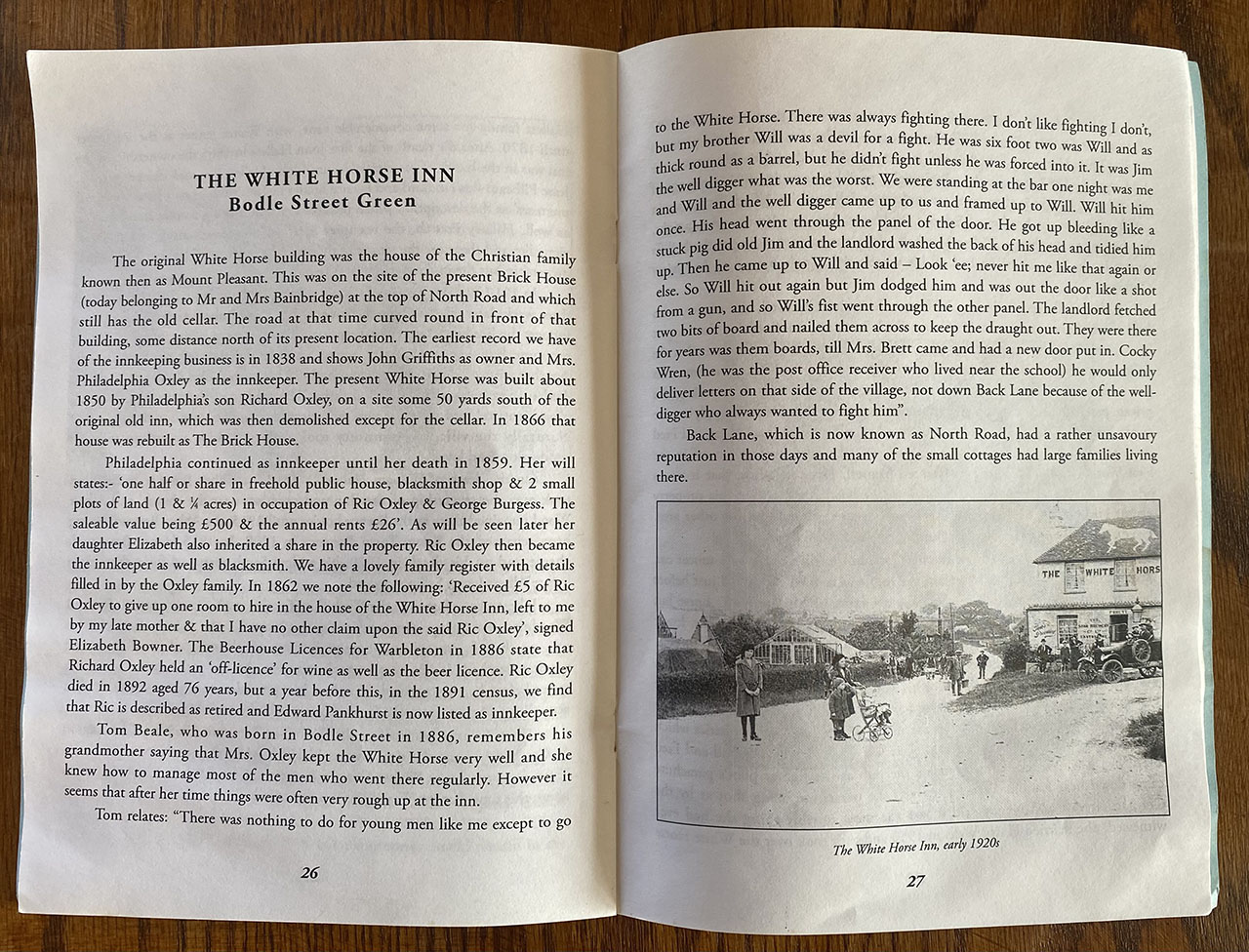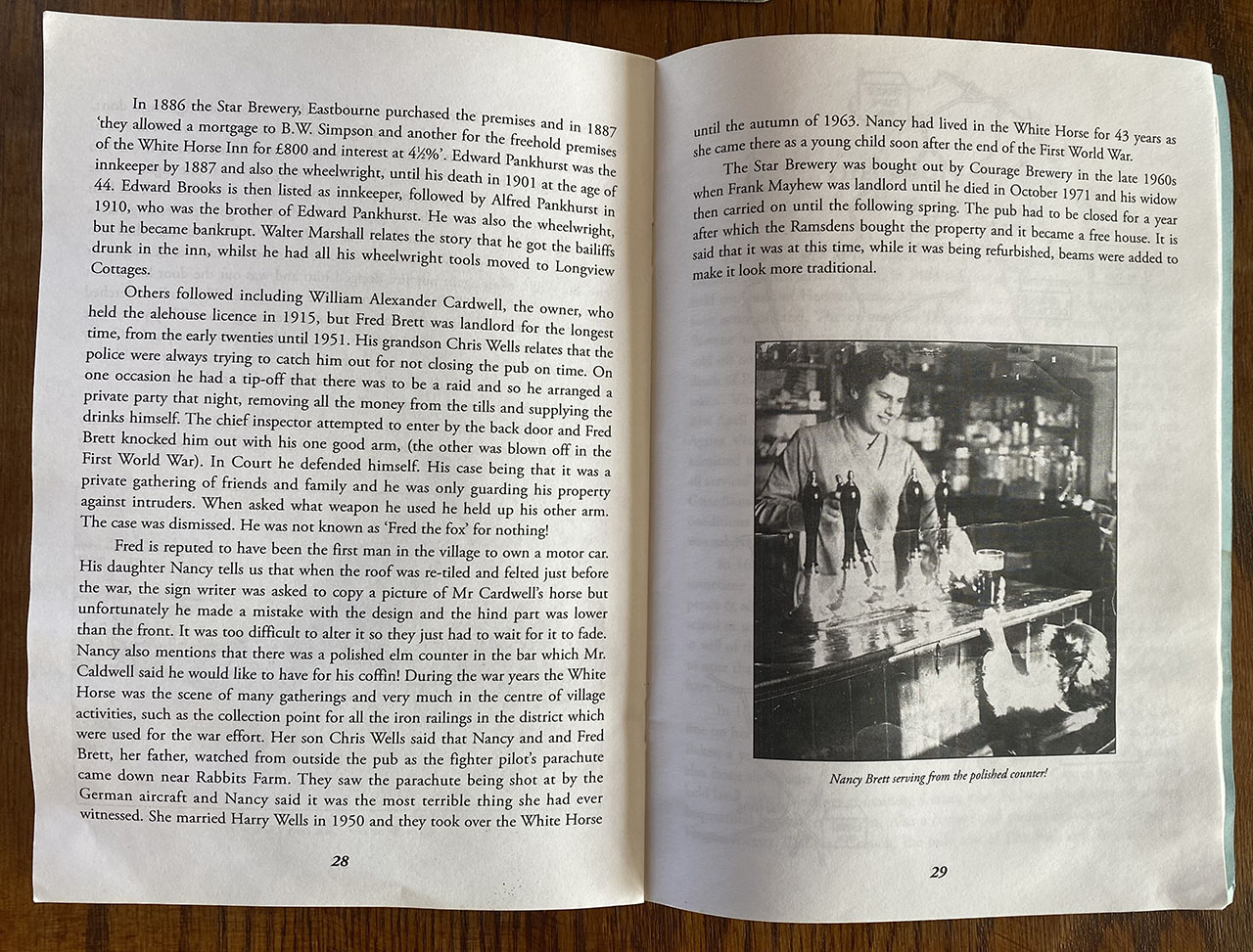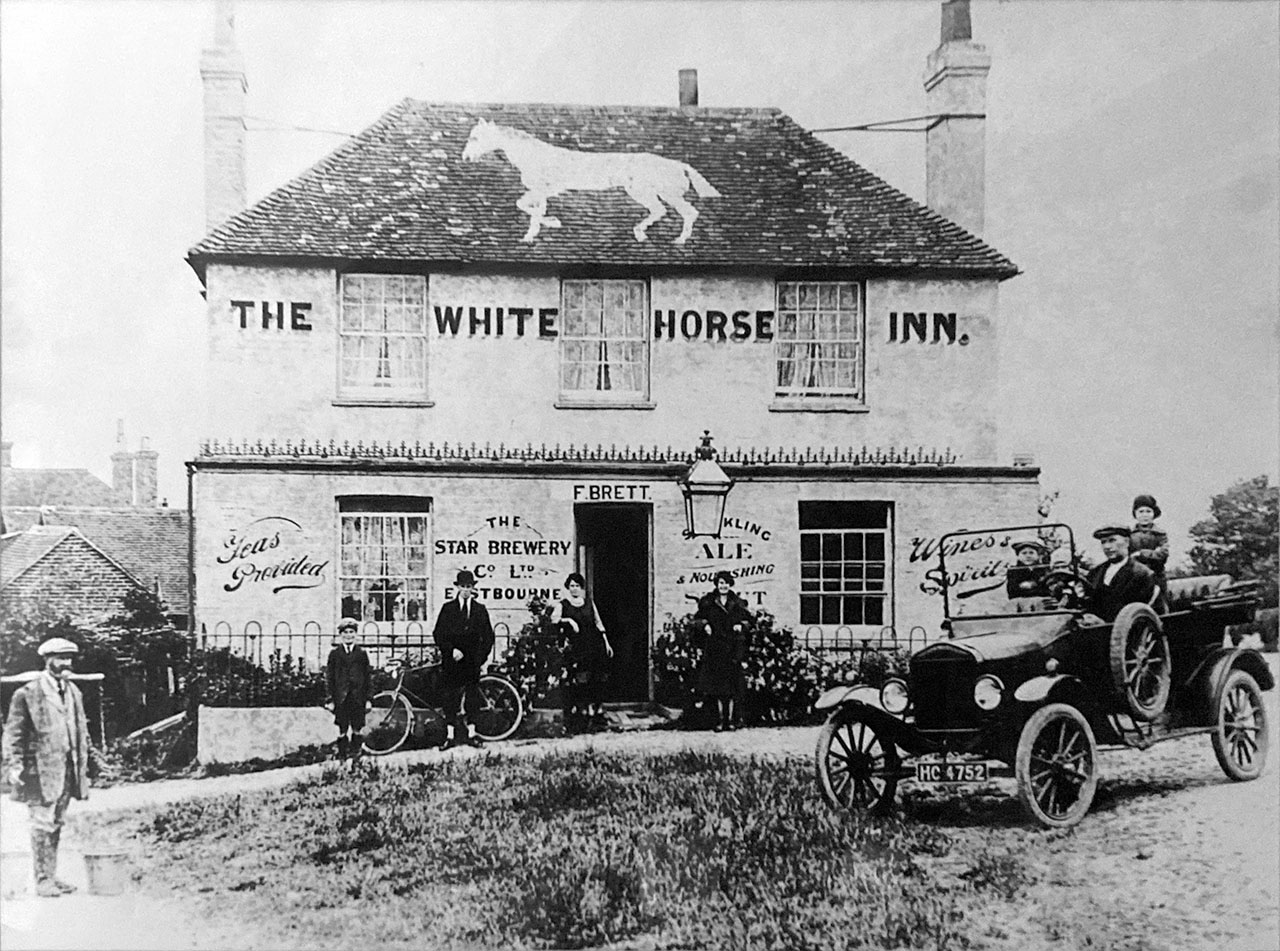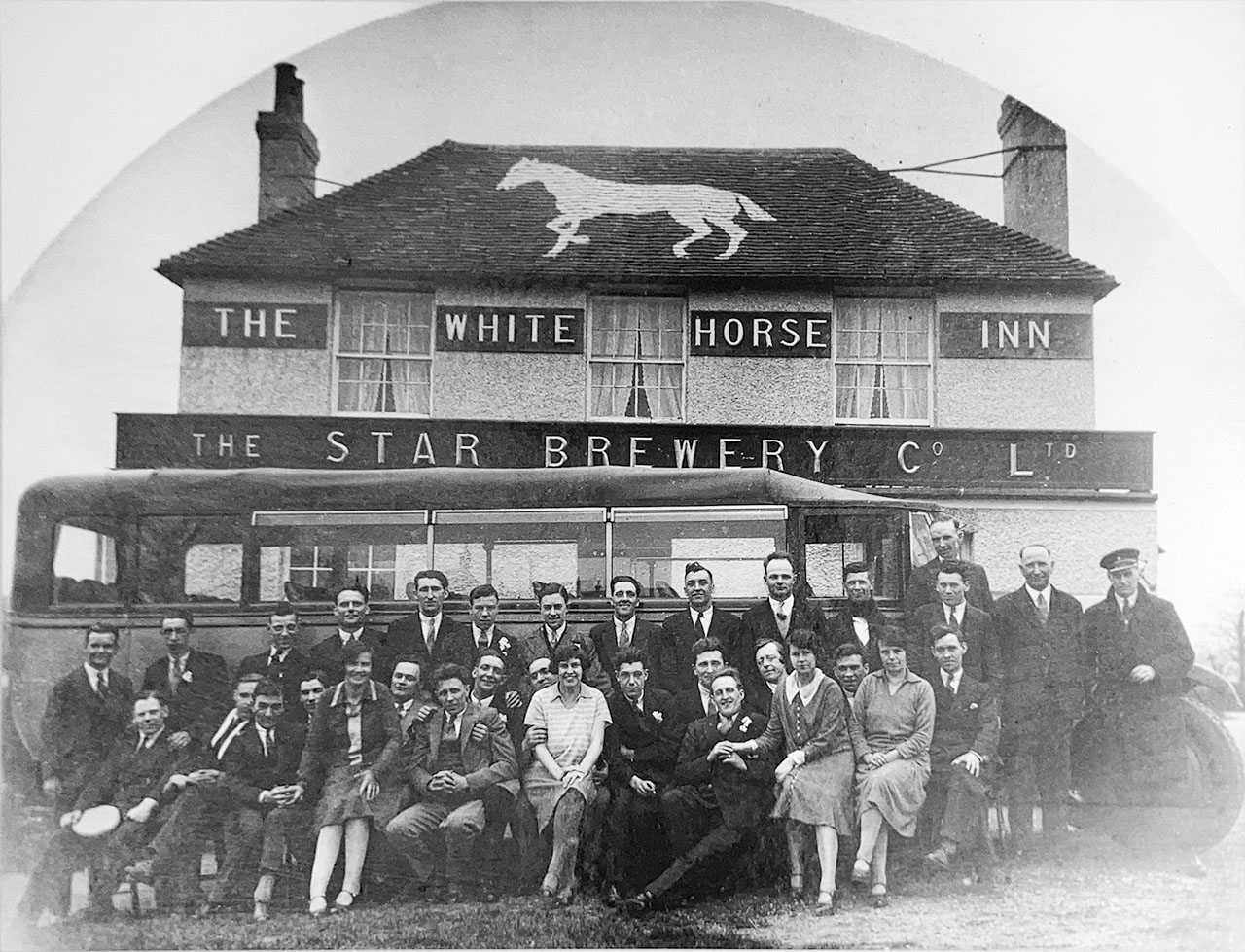History
We believe that the White Horse Inn was built around 1835 or so, but we have only anecdotal evidence for that.
The White Horse has a colourful history living on through both world wars and much more.
In the cellar we have a natural spring which trickles through the second to bottom step. There is a little channel that ushers the stream around the edge of the cellar, and down to the lowest point. This keeps the cellar at nearly the exact same temperature and humidity all year round making it a great cellar for keeping real ales.
The White Horse before the horse was painted on the Roof
The White Horse on the roof
One of the most useful hallmarks is the White Horse on the roof. The Pub stood for some 70-80 years with no horse on the roof.
The White Horse roof painting was commisioned by Mr Cardwell, who we think was the owner of the Star Brewery and kept racing horses of his own.
During the second world war the White Horse on the roof was covered over so that enemy pilots could not use it as a navigation aid. It made a return in the post war years, initially being painted facing the wrong way, and finally being corrected into the slightly chubby and bigger horse than the pre-war design.
The appearance and shape of the horse logo is a great indicator for dating photos and items like etched glasses and beer mats as the pre and post war designs differ quite a lot.
If you have any information or any further history of the White Horse, including any photos, please let us know
Thank you
The following is quoted from a book loaned to us by Chris, who was born in the White Horse
Thanks Chris!

The original White Horse building was the house of the Christian family known then as Mount Pleasant. This was on the site of the present Brick House at the top of North Road and which still has the old cellar. The road at that time curved round the front of that building, some distance north of its present location. The earliest record we have of the innkeeping business is in 1838 and shows John Griffiths as owner and Mrs. Philadelphia Oxley, on a site some 50 yards south of the original old inn, which was then demolished except for the cellar. In 1866 that house was rebuilt as The Brick House.
Philadelphia continued as innkeeper until her death in 1859. Her will states:-
As will be seen later her daughter Elizabeth also inherited a share of the property. Ric Oxley then became the innkeeper as well as blacksmith. We have a lovely family register with details filled in by the Oxley family. In 1862 we note the following:
signed Elizabeth Bowner. The Beerhouse Licences for Warbleton in 1886 state that Richard Oxley held an “off-licence” as well as the beer licence. Ric Oxley died in 1892 aged 76 years, but a year before this, in the 1891 census, we find that Ric is described as retired and Edward Pankhurst is now listed as innkeeper.
Trouble at the Horse
Tom Beale, who was born in Bodle Street in 1886, remembers his grandmother saying that Mrs Oxley kept the White Horse very well and she knew how to manage most of the men who went there regularly. However it seems that after her time things were often very rough up at the inn. Tom relates:
Back Lane, which is now known as North Road, had a rather unsavoury reputation in those days and many of the small cottages had large families living there.
The Star Brewery, Eastbourne

In 1886 the Star Brewery, Eastbourne purchased the premises and in 1887
Edward Pankhurst was the innkeeper by 1887 and also the wheelwright, until his death in 1901 at age of 44. Edward Brooks is then listed as innkeeper, followed by Alfred Pankhurst in 1910, who was the brother of Edward Pankhurst. He was also the wheelwright, but he became bankrupt. Walter Marshall relates the story that he got the bailiffs drunk at the inn, whilst he had all his wheelwright tools moved to Longview Cottages.
Other followed including William Alexander Cardwell, the owner, who held the alehouse licence in 1915, but Fred Brett was landlord for the longest time, from early twenties until 1951. His grandson Chris Wells relates that the police were always trying to catch him out for not closing the pub on time. On one occasion he had a tip-off that there was to be a raid and so he arranged a private party that night, removing all the money from the tills and supplying the drinks himself. The chief inspector attempted to enter by the back door and Fred Brett knocked him out with his one good arm, (the other was blown off in the First World War).
Fred Brett, in the dock.
In Court he defended himself. His case being that it was a private gathering of friends and family and he was only guarding his property against intruders. When asked what weapon he used he held up his other arm. The case was dismissed. He was not known as “Fred the fox” for nothing!
Fred is reputed to have been the first man in the village to own a motor car. His daughter Nancy tells us that when the roof was re-tiled and felted just before the war, the sign writer was asked to copy a picture of Mr Cardwell’s horse but unfortunately he made a mistake with the design and the hind part was lower than the front. It was too difficult to alter it so they just had to wait for it to fade. Nancy also mentions that there was a polished elm counter in the bar which Mr Cardwell said he would like to have for his coffin! During the war years the White Horse was the scene of many gatherings and very much in the centre of village activities, such as the collection point for iron railings in the district that was used for the war effort.
Her son Chris Wells said that Nancy and Fred Brett, her father, watched from outside the pub as the fighter pilot’s parachute came down near Rabbits Farm. They saw the parachute being shot at by the German aircraft and Nancy said it was the most terrible thing she had ever witnessed. She married Harry Wells in 1950 and they took over the White Horse until the autumn of 1963.
Nancy had lived in the White Horse for 43 years as she came there as a young child soon after the end of the First World War.
The Star Brewery was bought out by Courage Brewery in the late 1960s when Frank Mayhew was landlord until he died in October 1971 and his widow then carried on until the following spring. The pub had to be closed for a year after which the Ramsdens bought the property and it became a free house. It is said that it was this time, while being refurbished, beams were added to make it look more traditional.
So that takes us to 1972, when the Ramsdens gave the White Horse a very large overhaul.
We have an early photograph on the wall showing the pub, loosely speaking 100 years ago, with Fred Brett and Nancy his daughter (Our friend Chris' mother) in the Ford Model T, which was the first motor vehicle owned in Bodle Street Green. It shows a well kept pub, with beautiful period sign writing, and a few of the locals gathered outside.
We have another team photograph, with a motor coach is parked out the front. We know that this is pre-1939 as the roof has the pre-war horse on it. We know very little else about the background of this great picture.
Please, if you have any more information, we would love to talk to you.
The Star Brewery
Golden Hop Brewery (1777): The brewery was originally known as the Golden Hop Brewery and was established in 1777. It utilized the waters of the nearby Bourne Stream.
Star Brewery Company (1886): In October 1886, the Star Brewery Company was formed to acquire the business of William Alexander Cardwell, a partner in Hurst and Co.
Courage Takeover (1965): The brewery was taken over by Courage, Barclay & Simonds Ltd. in 1965. At that time, it had 43 tied houses.
Brewing Ceased (1967): Unfortunately, brewing operations ceased in 1967, and the main brewhouse (built in 1876) was demolished in 1971.
The Star Inn: Today, The Star Inn on Star Road in Eastbourne is all that remains of the old brewery. It was part of the original brewery site and now serves as a pub.
List of Star Brewery Pubs
- Alexandra Arms, Seaside Road, Eastbourne
- Beach Hotel, Beach Road, Eastbourne
- Devonshire Hotel, Seaside Road, Eastbourne
- Golden Hop Stores, Seaside, Eastbourne
- Lion Inn, Marine Parade, Eastbourne
- Off-licence, 63 Green Street, Old Town, Eastbourne
- Pilot Inn, Meads Street, Eastbourne
- Prince Albert, High Street, Old Town, Eastbourne (rebuilt 1936-1939)
- Rose & Crown, Langney Road, Eastbourne
- Star Inn, Star Road, Eastbourne (brewery tap)
- Star Vaults, Star Road, Eastbourne
- Granville Hotel, St Georges Road, Hastings
- Lord Nelson, East Bourne Street, Hastings
- Provincial Hotel, Havelock Road, Hastings
- Rising Sun, West Beach Street, Hastings
- Royal Standard, East Street, Hastings
- Black Horse, Wilmington, near Polegate
- British Queen, The Triangle, Willingdon
- Crown, High Street, Hailsham
- Eight Bells, High Street, Jevington
- Fullers Arms, Brightling
- Horse & Groom, High Street, Polegate
- Junction, Station Road, Polegate
- Kings Head, Horsebridge, near Hailsham
- Kings Head, Rye Hill, near Rye
- Lamb Inn, Wartling, near Pevensey
- Market Cross Inn, later Smugglers Inn, Market Cross, Alfriston
- Old Castle Inn, Winchelsea
- Old Kings Head, The Mount Street, Battle
- Olde Bell inn, The Mint, Rye
- Pipemakers Arms, Wish Street, Rye
- Royal Oak & Castle Inn, Eastbourne Road, Pevensey
- Star Inn, Normans Bay, near Eastbourne
- Station Hotel, Hellingley, near Hailsham
- Terminus Hotel, Station Road, Hailsham
- Three Cups, Punnetts Town, near Heathfield
- Tiger Inn, East Dean, near Eastbourne
- Wheatsheaf, Church Street, Willingdon
- White Horse, Bodle Street Green, near Herstmonceux

